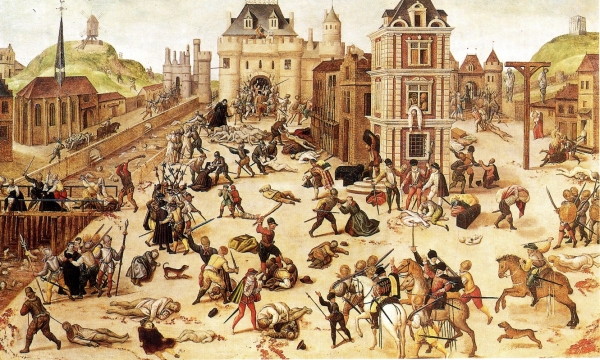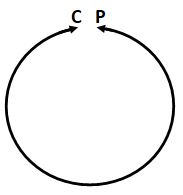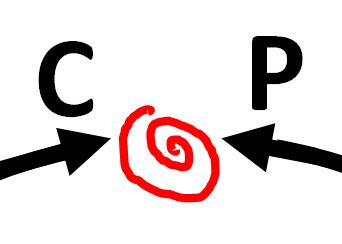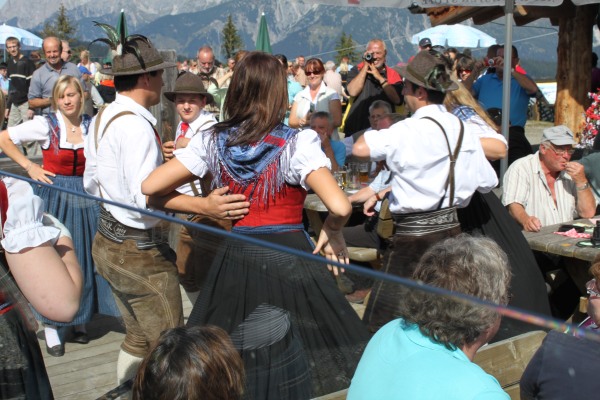In the political environment in the United States, where I currently live, but also in my home country in the center of Europe, Austria, and her neighbors as far West as the United Kingdom, the chasm between the conservative and progressive political views has widened considerably. (I am using progressive here and not liberal, because the latter has different meanings on the different continents.)
Do we even have to talk about politics? What about the notion that politics and religion should not be discussed? Well, politics quite literally means “of, for, or relating to citizens“. So yes, it has always been meant to be discussed amongst each other.
 Discussed. Debated even, maybe. Not used as a reason to yell at each other in disagreement. As a society we can honestly say, “Been there, done that.” See picture. Not necessary to go back there.
Discussed. Debated even, maybe. Not used as a reason to yell at each other in disagreement. As a society we can honestly say, “Been there, done that.” See picture. Not necessary to go back there.
And the divide, together with the animosities people hurtle at each other, has definitely infiltrated pagan social media groups and the blogging scene. Having read something in that respect in a blog article recently — something that clearly showed that the writer of that blog, like so many others, aren’t clear about the definitions of terms, let alone political and economic theories and philosophies — compelled me to finally post some of my own thoughts.
The author of the blog article in question, a self declared conservative, ripped apart the writing of another blogger who, the readers were told, showed his progressive bias when elaborating on different social and economic topics, apparently being judgmental towards conservative readers. At least that was the judgment of the conservative blogger.
What was striking in this blog posting, and is in so many a social media conversation, are not the opinions conservatives have, but that there are so many, often contradicting opinions what “conservative” actually is. Obviously, there are different types of conservatisms, such as fiscal conservatives (even those are divided into no-tax/no debt conservatives vs. laissez-faire conservatives (those who oppose any and all government regulations, even if they protect the conservatives opposing them (think clean air, clean water etc.)). There are social conservatives who oppose particular social progress, may that be the notion that anybody, no matter their sexual preference and identity, must have the same rights (from purchasing goods to being safe in public to enjoy the benefits of marriage). Or the opposed issue may be for a woman to choose carrying out a pregnancy. There are so many social issues that can — and need to — be leveled out if (and only if) a society truly embraces the notion of equality, and wants to adhere to a constitution that calls for equality amongst all people it governs.
And let’s not forget the conservatives who would like to bring back feudalism. For them, all the conservatives mentioned above are as progressive/liberal as they come. Democracy? Republic? Self-governance of “the people”, low-born commoners, sounds as crazy for them as free market capitalism, the idea of non-nobles owning anything beyond the filthy rags on their backs.
Clearly, while conservatism wants to hold on to, conserve, some values of old, these values progress throughout time as well. And thus, my question is not, “Are you a conservative?” but “What is it that you want to conserve? And does that make sense?”
I am happy do debate each and every one of the political angles of conservative vs. progressive ideas. Another day, at another place. Maybe in a pub over a beer or two. But here, we are actually talking about a spiritual movement, not a political one.
There is a conservative element to paganism. The movement embraces a (very) old worldview, wants to re-connect with, and hold on to, values and procedures and pantheons and morals and art and garment and and and from roughly 1,500 and more years ago. What the Old Faith, the pre-Christian spirituality paganism invokes is what draws me and so many others to it. Insofar, paganism is, per definitionem (Latin, very conservative), spiritually conservative.
While that’s pretty much straight forward, we are, as a species, also political, and therefore more complex. And complicated. Obviously, each and everyone of us has the freedom to choose, for oneself, which values one should embrace and uphold. However, when we combine our spiritual value set with our political one, we all have to be clear about that any value, and personal right, that came about after the rise of Christianity, is a progressive/liberal idea relative to pagan times. Freedom of speech, the right to vote and participate in the political process? A fair trial? Any sense of equality or the notion that all have the same opportunities? Not in pagan times. Unless you belonged to the few that were nobility, you had to shut up and work until you dropped. Land ownership? Pffft. Taxes yes, but a tax code regulating what you ought to pay? Ha! Not being judged? Forget that.
Clearly, reconciling political and spiritual conservatism under these aspects is not that easy. One would need to define the latter exactly, all the while knowing that one’s social conservatism is not rooted in pagan times. Any choice of post-pagan conservative value therefore seems almost arbitrary. For example, the nowadays deemed conservative value of being pro life (as the blog writer mentioned above claimed to be) is not an originally pagan value. Back then, women knew which plants to consume as a contraceptive, and which one to abort a pregnancy. The “day-after-pill was a nightshade growing at the edge of the forest, available to everyone (dispensed by the knowledgeable witch, though). What to collect and how to process was knowledge handed down from generation to generation. It was as little an issue as setting out unwanted newborns in the wilderness. Such was the practice in pagan times.
Which is not what I am not advertising here, by all that is fair and free! I m just pointing out that we shan’t be carried away in our romantic embrace of the good old times too much.
Insofar, the idea of the Christian Church to forbid contraception and abortion, to regulate a woman’s reproductive choices, was outlandishly and outrageously progressive for the pagans of old, and fought against openly and subversively.
Again, I am not here to convince anyone to choose one value set over the other, or to drop what they’ve held dear all their lives. My mission is to make sure folks understand the complexity of their choices. In other words, all this is not to say one shouldn’t be “conservative”. Whatever works for you. As everybody else, I obviously have my opinions about these issues, and reserve the right to keep, and utter, them when asked.
So, when I claim here that I do not — nor should I or anyone else — mind that folks have quite opposing views on how our species should best negotiate living together somewhat harmoniously in this herd of about seven billion heads, I will at the same time say that I very much mind the manner of the discourse. Especially when such discourse is conducted without any manners.
But while I obviously cannot patronize everybody into a behavior to my liking, I would like to offer a thought on how we, pagans of seemingly opposite worldviews, are, when you think about it, closer to each other than our opinions, and how we utter them, often suggest.
When you think about conservative and progressive being the opposing endpoints of a line, you have the typical way of depicting that seemingly unresolvable conundrum.

Yet, if you think about how much of our lives isn’t happening on straight lines, but much  rather in circles, go ahead and bend that line with these opposing end points into one. Not surprisingly, conservative and progressive are all of the sudden very close to each other. If you were to zoom in, you just might notice that there is a little space between the two ends of the line. This is the place where we pagans mingle, the space betwixt and between, where the veil to the Otherworld is thinnest, where we meet Gods and Goddesses, Spirits and Guides, Faeries and Angles
rather in circles, go ahead and bend that line with these opposing end points into one. Not surprisingly, conservative and progressive are all of the sudden very close to each other. If you were to zoom in, you just might notice that there is a little space between the two ends of the line. This is the place where we pagans mingle, the space betwixt and between, where the veil to the Otherworld is thinnest, where we meet Gods and Goddesses, Spirits and Guides, Faeries and Angles and Selkies, Gnomes, Elves and Dwarfs. And each other. Just seems that our values and issues are not only in the same place, really. Relative to who else is hanging around in that magical space, our views and beliefs, as opposing as they are, also appear rather close to each other.
and Selkies, Gnomes, Elves and Dwarfs. And each other. Just seems that our values and issues are not only in the same place, really. Relative to who else is hanging around in that magical space, our views and beliefs, as opposing as they are, also appear rather close to each other.
This is a good place, one in which we all feel comfortable. And since it’s so small, and so close to the divine, to the Magic, we all have the responsibility to keep it “clean” and welcoming.
 So why not, rather than verbally maim each other not unlike it is shown for real in the clash of faiths — the conservative Catholics vs. the progressive Huguenots — in the first picture way above, discuss our thoughts and move on in merriment, like the picture — also showing a quite traditional human interaction — here suggests?
So why not, rather than verbally maim each other not unlike it is shown for real in the clash of faiths — the conservative Catholics vs. the progressive Huguenots — in the first picture way above, discuss our thoughts and move on in merriment, like the picture — also showing a quite traditional human interaction — here suggests?
This blog writer is also the author of “Mountain Magic”, a book on how one can integrate Alpine customs and lore into one’s personal maical practice. Available at lulu.com (preferred) and distributers such as amazon.com

It’s really hard to have a conversation with people who see you and your loved ones subhuman though.
Absolutely! One of my course of actions in such cases is to call out their hypocrisy, and to take back what’s rightfully mine/ours, which is to claim *real* values of old (e.g. Goddess, ensuring that future generations don’t have to pay the debt for the abuse of nature etc.)
I think it is important to change the discourse to something real instead of talking points devised by outlets more interested in propaganda. I am trying hard to avoid using vague abstract concepts by asking about real life specifics instead. That creates a conversation instead of reflex phrases being vomited out.